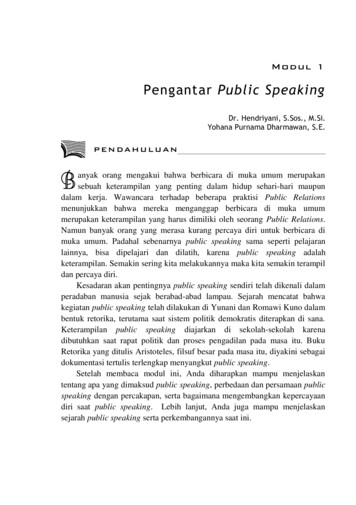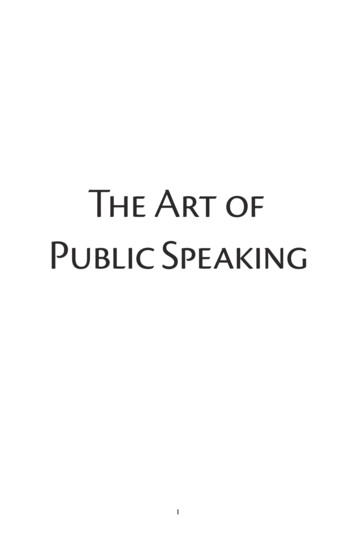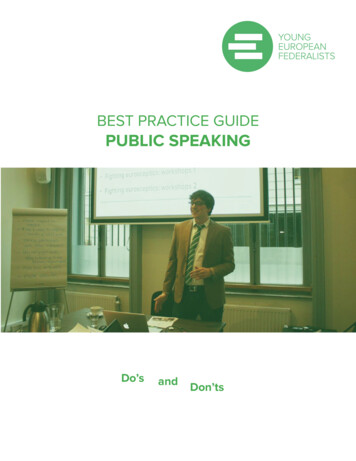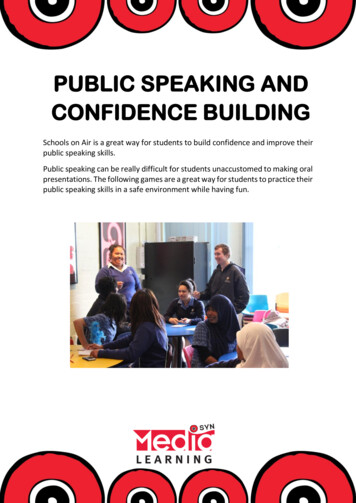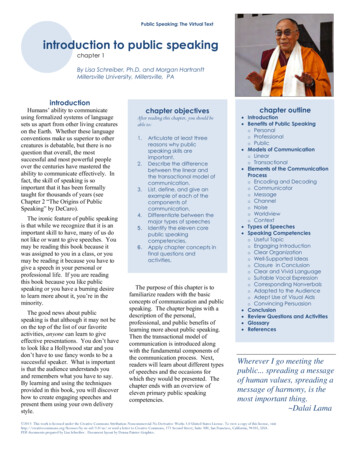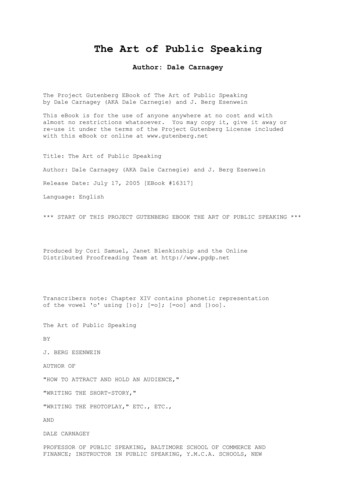
Transcription
The Art of Public SpeakingAuthor: Dale CarnageyThe Project Gutenberg EBook of The Art of Public Speakingby Dale Carnagey (AKA Dale Carnegie) and J. Berg EsenweinThis eBook is for the use of anyone anywhere at no cost and withalmost no restrictions whatsoever. You may copy it, give it away orre-use it under the terms of the Project Gutenberg License includedwith this eBook or online at www.gutenberg.netTitle: The Art of Public SpeakingAuthor: Dale Carnagey (AKA Dale Carnegie) and J. Berg EsenweinRelease Date: July 17, 2005 [EBook #16317]Language: English*** START OF THIS PROJECT GUTENBERG EBOOK THE ART OF PUBLIC SPEAKING ***Produced by Cori Samuel, Janet Blenkinship and the OnlineDistributed Proofreading Team at http://www.pgdp.netTranscribers note: Chapter XIV contains phonetic representationof the vowel 'o' using [)o]; [ o]; [ oo] and [)oo].The Art of Public SpeakingBYJ. BERG ESENWEINAUTHOR OF"HOW TO ATTRACT AND HOLD AN AUDIENCE,""WRITING THE SHORT-STORY,""WRITING THE PHOTOPLAY," ETC., ETC.,ANDDALE CARNAGEYPROFESSOR OF PUBLIC SPEAKING, BALTIMORE SCHOOL OF COMMERCE ANDFINANCE; INSTRUCTOR IN PUBLIC SPEAKING, Y.M.C.A. SCHOOLS, NEW
YORK, BROOKLYN, BALTIMORE, AND PHILADELPHIA, AND THE NEW YORKCITY CHAPTER, AMERICAN INSTITUTE OF BANKINGTHE WRITER'S LIBRARYEDITED BY J. BERG ESENWEINTHE HOME CORRESPONDENCE SCHOOLSPRINGFIELD, MASS.PUBLISHERSCopyright 1915THE HOME CORRESPONDENCE SCHOOLALL RIGHTS RESERVEDTO F. ARTHUR METCALFFELLOW-WORKER AND FRIENDTable of ContentsTHINGS TO THINK OF FIRST--A FOREWORDCHAPTER I--ACQUIRING CONFIDENCE BEFORE AN AUDIENCECHAPTER II--THE SIN OF MONOTONYCHAPTER III--EFFICIENCY THROUGH EMPHASIS AND SUBORDINATIONCHAPTER IV--EFFICIENCY THROUGH CHANGE OF PITCHCHAPTER V--EFFICIENCY THROUGH CHANGE OF PACECHAPTER VI--PAUSE AND POWERCHAPTER VII--EFFICIENCY THROUGH INFLECTIONCHAPTER VIII--CONCENTRATION IN DELIVERYCHAPTER IX--FORCECHAPTER X--FEELING AND ENTHUSIASMCHAPTER XI--FLUENCY THROUGH PREPARATIONCHAPTER XII--THE VOICECHAPTER XIII--VOICE CHARMCHAPTER XIV--DISTINCTNESS AND PRECISION OF UTTERANCECHAPTER XV--THE TRUTH ABOUT GESTURECHAPTER XVI--METHODS OF DELIVERYCHAPTER XVII--THOUGHT AND RESERVE POWERCHAPTER XVIII--SUBJECT AND PREPARATIONCHAPTER XIX--INFLUENCING BY EXPOSITIONCHAPTER XX--INFLUENCING BY DESCRIPTIONCHAPTER XXI--INFLUENCING BY NARRATIONCHAPTER XXII--INFLUENCING BY SUGGESTIONCHAPTER XXIII--INFLUENCING BY ARGUMENTCHAPTER XXIV--INFLUENCING BY PERSUASIONCHAPTER XXV--INFLUENCING THE CROWDCHAPTER XXVI--RIDING THE WINGED HORSECHAPTER XXVII--GROWING A VOCABULARYCHAPTER XXVIII--MEMORY TRAININGCHAPTER XXIX--RIGHT THINKING AND PERSONALITYCHAPTER XXX--AFTER-DINNER AND OTHER OCCASIONAL SPEAKINGCHAPTER XXXI--MAKING CONVERSATION 171184199218231249262280295308321334343355362372
APPENDIXAPPENDIXAPPENDIXAPPENDIXA--FIFTY QUESTIONS FOR DEBATE379B--THIRTY THEMES FOR SPEECHES, WITH SOURCE-REFERENCESC--SUGGESTIVE SUBJECTS FOR SPEECHES; HINTS FOR TREATMENTD--SPEECHES FOR STUDY AND PRACTISE394GENERAL INDEX383386506 Things to Think of First A FOREWORDThe efficiency of a book is like that of a man, in one importantrespect: its attitude toward its subject is the first source of itspower. A book may be full of good ideas well expressed, but if itswriter views his subject from the wrong angle even his excellent advicemay prove to be ineffective.This book stands or falls by its authors' attitude toward its subject.If the best way to teach oneself or others to speak effectively inpublic is to fill the mind with rules, and to set up fixed standards forthe interpretation of thought, the utterance of language, the making ofgestures, and all the rest, then this book will be limited in value tosuch stray ideas throughout its pages as may prove helpful to thereader--as an effort to enforce a group of principles it must bereckoned a failure, because it is then untrue.It is of some importance, therefore, to those who take up this volumewith open mind that they should see clearly at the out-start what is thethought that at once underlies and is builded through this structure. Inplain words it is this:Training in public speaking is not a matter of externals--primarily; itis not a matter of imitation--fundamentally; it is not a matter ofconformity to standards--at all. Public speaking is public utterance,public issuance, of the man himself; therefore the first thing both intime and in importance is that the man should be and think and feelthings that are worthy of being given forth. Unless there be somethingof value within, no tricks of training can ever make of the talkeranything more than a machine--albeit a highly perfected machine--for thedelivery of other men's goods. So self-development is fundamental in ourplan.The second principle lies close to the first: The man must enthrone hiswill to rule over his thought, his feelings, and all his physicalpowers, so that the outer self may give perfect, unhampered expressionto the inner. It is futile, we assert, to lay down systems of rules forvoice culture, intonation, gesture, and what not, unless these twoprinciples of having something to say and making the will sovereign haveat least begun to make themselves felt in the life.The third principle will, we surmise, arouse no dispute: No one canlearn how to speak who does not first speak as best he can. That mayseem like a vicious circle in statement, but it will bear examination.Many teachers have begun with the how . Vain effort! It is an ancienttruism that we learn to do by doing. The first thing for the beginner inpublic speaking is to speak--not to study voice and gesture and the
rest. Once he has spoken he can improve himself by self-observation oraccording to the criticisms of those who hear.But how shall he be able to criticise himself? Simply by finding outthree things: What are the qualities which by common consent go to makeup an effective speaker; by what means at least some of these qualitiesmay be acquired; and what wrong habits of speech in himself work againsthis acquiring and using the qualities which he finds to be good.Experience, then, is not only the best teacher, but the first and thelast. But experience must be a dual thing--the experience of others mustbe used to supplement, correct and justify our own experience; in thisway we shall become our own best critics only after we have trainedourselves in self-knowledge, the knowledge of what other minds think,and in the ability to judge ourselves by the standards we have come tobelieve are right. "If I ought," said Kant, "I can."An examination of the contents of this volume will show how consistentlythese articles of faith have been declared, expounded, and illustrated.The student is urged to begin to speak at once of what he knows. Then heis given simple suggestions for self-control, with gradually increasingemphasis upon the power of the inner man over the outer. Next, the wayto the rich storehouses of material is pointed out. And finally, all thewhile he is urged to speak, speak , SPEAK as he is applying to his ownmethods, in his own personal way, the principles he has gathered fromhis own experience and observation and the recorded experiences ofothers.So now at the very first let it be as clear as light that methods aresecondary matters; that the full mind, the warm heart, the dominant willare primary--and not only primary but paramount; for unless it be a fullbeing that uses the methods it will be like dressing a wooden image inthe clothes of a man.J. BERG ESENWEIN.NARBERTH, PA.,JANUARY 1, 1915.THE ART OF PUBLIC SPEAKINGSense never fails to give them that have it, Words enough tomake them understood. It too often happens in someconversations, as in Apothecary Shops, that those Pots that areEmpty, or have Things of small Value in them, are as gaudilyDress'd as those that are full of precious Drugs.They that soar too high, often fall hard, making a low and levelDwelling preferable. The tallest Trees are most in the Power ofthe Winds, and Ambitious Men of the Blasts of Fortune. Buildingshave need of a good Foundation, that lie so much exposed to theWeather.--WILLIAM PENN.
CHAPTER IACQUIRING CONFIDENCE BEFORE AN AUDIENCEThere is a strange sensation often experienced in the presenceof an audience. It may proceed from the gaze of the many eyesthat turn upon the speaker, especially if he permits himself tosteadily return that gaze. Most speakers have been conscious ofthis in a nameless thrill, a real something, pervading theatmosphere, tangible, evanescent, indescribable. All writershave borne testimony to the power of a speaker's eye inimpressing an audience. This influence which we are nowconsidering is the reverse of that picture--the power theireyes may exert upon him, especially before he begins to speak:after the inward fires of oratory are fanned into flame the eyesof the audience lose all terror.--WILLIAM PITTENGER, Extempore Speech .Students of public speaking continually ask, "How can I overcomeself-consciousness and the fear that paralyzes me before an audience?"Did you ever notice in looking from a train window that some horses feednear the track and never even pause to look up at the thundering cars,while just ahead at the next railroad crossing a farmer's wife will benervously trying to quiet her scared horse as the train goes by?How would you cure a horse that is afraid of cars--graze him in aback-woods lot where he would never see steam-engines or automobiles, ordrive or pasture him where he would frequently see the machines?Apply horse-sense to ridding yourself of self-consciousness and fear:face an audience as frequently as you can, and you will soon stopshying. You can never attain freedom from stage-fright by reading atreatise. A book may give you excellent suggestions on how best toconduct yourself in the water, but sooner or later you must get wet,perhaps even strangle and be "half scared to death." There are a greatmany "wetless" bathing suits worn at the seashore, but no one everlearns to swim in them. To plunge is the only way.Practise, practise , PRACTISE in speaking before an audience will tendto remove all fear of audiences, just as practise in swimming will leadto confidence and facility in the water. You must learn to speak byspeaking.The Apostle Paul tells us that every man must work out his ownsalvation. All we can do here is to offer you suggestions as to how bestto prepare for your plunge. The real plunge no one can take for you. Adoctor may prescribe, but you must take the medicine.Do not be disheartened if at first you suffer from stage-fright. DanPatch was more susceptible to suffering than a superannuated dray horsewould be. It never hurts a fool to appear before an audience, for hiscapacity is not a capacity for feeling. A blow that would kill acivilized man soon heals on a savage. The higher we go in the scale oflife, the greater is the capacity for suffering.For one reason or another, some master-speakers never entirely overcomestage-fright, but it will pay you to spare no pains to conquer it.Daniel Webster failed in his first appearance and had to take his seat
without finishing his speech because he was nervous. Gladstone was oftentroubled with self-consciousness in the beginning of an address.Beecher was always perturbed before talking in public.Blacksmiths sometimes twist a rope tight around the nose of a horse, andby thus inflicting a little pain they distract his attention from theshoeing process. One way to get air out of a glass is to pour in water.Be Absorbed by Your SubjectApply the blacksmith's homely principle when you are speaking. If youfeel deeply about your subject you will be able to think of little else.Concentration is a process of distraction from less important matters.It is too late to think about the cut of your coat when once you areupon the platform, so centre your interest on what you are about tosay--fill your mind with your speech-material and, like the infillingwater in the glass, it will drive out your unsubstantial fears.Self-consciousness is undue consciousness of self, and, for the purposeof delivery, self is secondary to your subject, not only in the opinionof the audience, but, if you are wise, in your own. To hold any otherview is to regard yourself as an exhibit instead of as a messenger witha message worth delivering. Do you remember Elbert Hubbard's tremendouslittle tract, "A Message to Garcia"? The youth subordinated himself tothe message he bore. So must you, by all the determination you canmuster. It is sheer egotism to fill your mind with thoughts of self whena greater thing is there-- TRUTH . Say this to yourself sternly, andshame your self-consciousness into quiescence. If the theater caughtfire you could rush to the stage and shout directions to the audiencewithout any self-consciousness, for the importance of what you weresaying would drive all fear-thoughts out of your mind.Far worse than self-consciousness through fear of doing poorly isself-consciousness through assumption of doing well. The first sign ofgreatness is when a man does not attempt to look and act great. Beforeyou can call yourself a man at all, Kipling assures us, you must "notlook too good nor talk too wise."Nothing advertises itself so thoroughly as conceit. One may be so fullof self as to be empty. Voltaire said, "We must conceal self-love." Butthat can not be done. You know this to be true, for you have recognizedoverweening self-love in others. If you have it, others are seeing it inyou. There are things in this world bigger than self, and in working forthem self will be forgotten, or--what is better--remembered only so asto help us win toward higher things.Have Something to SayThe trouble with many speakers is that they go before an audience withtheir minds a blank. It is no wonder that nature, abhorring a vacuum,fills them with the nearest thing handy, which generally happens to be,"I wonder if I am doing this right! How does my hair look? I know Ishall fail." Their prophetic souls are sure to be right.It is not enough to be absorbed by your subject--to acquireself-confidence you must have something in which to be confident. If yougo before an audience without any preparation, or previous knowledge ofyour subject, you ought to be self-conscious--you ought to be ashamed tosteal the time of your audience. Prepare yourself. Know what you are
going to talk about, and, in general, how youthe first few sentences worked out completelytroubled in the beginning to find words. Knowyour hearers know it, and you have nothing toare going to say it. Haveso that you may not beyour subject better thanfear.After Preparing for Success, Expect ItLet your bearing be modestly confident, but most of all be modestlyconfident within. Over-confidence is bad, but to tolerate premonitionsof failure is worse, for a bold man may win attention by his verybearing, while a rabbit-hearted coward invites disaster.Humility is not the personal discount that we must offer in the presenceof others--against this old interpretation there has been a most healthymodern reaction. True humility any man who thoroughly knows himself mustfeel; but it is not a humility that assumes a worm-like meekness; it israther a strong, vibrant prayer for greater power for service--a prayerthat Uriah Heep could never have uttered.Washington Irving once introduced Charles Dickens at a dinner given inthe latter's honor. In the middle of his speech Irving hesitated, becameembarrassed, and sat down awkwardly. Turning to a friend beside him heremarked, "There, I told you I would fail, and I did."If you believe you will fail, there is no hope for you. You will.Rid yourself of this I-am-a-poor-worm-in-the-dust idea. You are a god,with infinite capabilities. "All things are ready if the mind be so."The eagle looks the cloudless sun in the face.Assume Mastery Over Your AudienceIn public speech, as in electricity, there is a positive and a negativeforce. Either you or your audience are going to possess the positivefactor. If you assume it you can almost invariably make it yours. If youassume the negative you are sure to be negative. Assuming a virtue or avice vitalizes it. Summon all your power of self-direction, and rememberthat though your audience is infinitely more important than you, thetruth is more important than both of you, because it is eternal. If yourmind falters in its leadership the sword will drop from your hands. Yourassumption of being able to instruct or lead or inspire a multitude oreven a small group of people may appall you as being colossalimpudence--as indeed it may be; but having once essayed to speak, becourageous. BE courageous--it lies within you to be what you will.MAKE yourself be calm and confident.Reflect that your audience will not hurt you. If Beecher in Liverpoolhad spoken behind a wire screen he would have invited the audience tothrow the over-ripe missiles with which they were loaded; but he was aman, confronted his hostile hearers fearlessly--and won them.In facing your audience, pause a moment and look them over--a hundredchances to one they want you to succeed, for what man is so foolish asto spend his time, perhaps his money, in the hope that you will wastehis investment by talking dully?Concluding Hints
Do not make haste to begin--haste shows lack of control.Do not apologize. It ought not to be necessary; and if it is, it willnot help. Go straight ahead.Take a deep breath, relax, and begin in a quiet conversational tone asthough you were speaking to one large friend. You will not find it halfso bad as you imagined; really, it is like taking a cold plunge: afteryou are in, the water is fine. In fact, having spoken a few times youwill even anticipate the plunge with exhilaration. To stand before anaudience and make them think your thoughts after you is one of thegreatest pleasures you can ever know. Instead of fearing it, you oughtto be as anxious as the fox hounds straining at their leashes, or therace horses tugging at their reins.So cast out fear, for fear is cowardly--when it is not mastered. Thebravest know fear, but they do not yield to it. Face your audiencepluckily--if your knees quake, MAKE them stop. In your audience liessome victory for you and the cause you represent. Go win it. SupposeCharles Martell had been afraid to hammer the Saracen at Tours; supposeColumbus had feared to venture out into the unknown West; suppose ourforefathers had been too timid to oppose the tyranny of George theThird; suppose that any man who ever did anything worth while had been acoward! The world owes its progress to the men who have dared, and youmust dare to speak the effective word that is in your heart tospeak--for often it requires courage to utter a single sentence. Butremember that men erect no monuments and weave no laurels for those whofear to do what they can.Is all this unsympathetic, do you say?Man, what you need is not sympathy, but a push. No one doubts thattemperament and nerves and illness and even praiseworthy modesty may,singly or combined, cause the speaker's cheek to blanch before anaudience, but neither can any one doubt that coddling will magnify thisweakness. The victory lies in a fearless frame of mind. Prof. WalterDill Scott says: "Success or failure in business is caused more bymental attitude even than by mental capacity." Banish the fear-attitude;acquire the confident attitude. And remember that the only way toacquire it is-- to acquire it .In this foundation chapter we have tried to strike the tone of much thatis to follow. Many of these ideas will be amplified and enforced in amore specific way; but through all these chapters on an art which Mr.Gladstone believed to be more powerful than the public press, the noteof justifiable self-confidence must sound again and again.QUESTIONS AND EXERCISES.1. What is the cause of self-consciousness?2. Why are animals free from it?3. What is your observation regarding self-consciousness in children?4. Why are you free from it under the stress of unusual excitement?5. How does moderate excitement affect you?6. What are the two fundamental requisites for the acquiring of
self-confidence? Which is the more important?7. What effect does confidence on the part of the speaker have on theaudience?8. Write out a two-minute speech on "Confidence and Cowardice."9. What effect do habits of thought have on confidence? In thisconnection read the chapter on "Right Thinking and Personality."10. Write out very briefly any experience you may have had involving theteachings of this chapter.11. Give a three-minute talk on "Stage-Fright," including a (kindly)imitation of two or more victims.CHAPTER IITHE SIN OF MONOTONYOne day Ennui was born from Uniformity.--MOTTE.Our English has changed with the years so that many words now connotemore than they did originally. This is true of the word monotonous .From "having but one tone," it has come to mean more broadly, "lack ofvariation."The monotonous speaker not only drones along in the same volume andpitch of tone but uses always the same emphasis, the same speed, thesame thoughts--or dispenses with thought altogether.Monotony, the cardinal and most common sin of the public speaker, is nota transgression--it is rather a sin of omission, for it consists inliving up to the confession of the Prayer Book: "We have left undonethose things we ought to have done."Emerson says, "The virtue of art lies in detachment, in sequestering oneobject from the embarrassing variety." That is just what the monotonousspeaker fails to do--he does not detach one thought or phrase fromanother, they are all expressed in the same manner.To tell you that your speech is monotonous may mean very little to you,so let us look at the nature--and the curse--of monotony in otherspheres of life, then we shall appreciate more fully how it will blightan otherwise good speech.If the Victrola in the adjoining apartment grinds out just threeselections over and over again, it is pretty safe to assume that yourneighbor has no other records. If a speaker uses only a few of hispowers, it points very plainly to the fact that the rest of his powersare not developed. Monotony reveals our limitations.In its effect on its victim, monotony is actually deadly--it will drivethe bloom from the cheek and the lustre from the eye as quickly as sin,and often leads to viciousness. The worst punishment that human
ingenuity has ever been able to invent is extreme monotony--solitaryconfinement. Lay a marble on the table and do nothing eighteen hours ofthe day but change that marble from one point to another and back again,and you will go insane if you continue long enough.So this thing that shortens life, and is used as the most cruel ofpunishments in our prisons, is the thing that will destroy all the lifeand force of a speech. Avoid it as you would shun a deadly dull bore.The "idle rich" can have half-a-dozen homes, command all the varietiesof foods gathered from the four corners of the earth, and sail forAfrica or Alaska at their pleasure; but the poverty-stricken man mustwalk or take a street car--he does not have the choice of yacht, auto,or special train. He must spend the most of his life in labor and becontent with the staples of the food-market. Monotony is poverty,whether in speech or in life. Strive to increase the variety of yourspeech as the business man labors to augment his wealth.Bird-songs, forest glens, and mountains are not monotonous--it is thelong rows of brown-stone fronts and the miles of paved streets that areso terribly same. Nature in her wealth gives us endless variety; manwith his limitations is often monotonous. Get back to nature in yourmethods of speech-making.The power of variety lies in its pleasure-giving quality. The greattruths of the world have often been couched in fascinating stories--"LesMiserables," for instance. If you wish to teach or influence men, youmust please them, first or last. Strike the same note on the piano overand over again. This will give you some idea of the displeasing, jarringeffect monotony has on the ear. The dictionary defines "monotonous" asbeing synonymous with "wearisome." That is putting it mildly. It ismaddening. The department-store prince does not disgust the public byplaying only the one tune, "Come Buy My Wares!" He gives recitals on a 125,000 organ, and the pleased people naturally slip into a buyingmood.How to Conquer MonotonyWe obviate monotony in dress by replenishing our wardrobes. We avoidmonotony in speech by multiplying our powers of speech. We multiply ourpowers of speech by increasing our tools.The carpenter has special implements with which to construct the severalparts of a building. The organist has certain keys and stops which hemanipulates to produce his harmonies and effects. In like manner thespeaker has certain instruments and tools at his command by which hebuilds his argument, plays on the feelings, and guides the beliefs ofhis audience. To give you a conception of these instruments, andpractical help in learning to use them, are the purposes of theimmediately following chapters.Why did not the Children of Israel whirl through the desert inlimousines, and why did not Noah have moving-picture entertainments andtalking machines on the Ark? The laws that enable us to operate anautomobile, produce moving-pictures, or music on the Victrola, wouldhave worked just as well then as they do today. It was ignorance of lawthat for ages deprived humanity of our modern conveniences. Manyspeakers still use ox-cart methods in their speech instead of employingautomobile or overland-express methods. They are ignorant of laws thatmake for efficiency in speaking. Just to the extent that you regard anduse the laws that we are about to examine and learn how to use will you
have efficiency and force in your speaking; and just to the extent thatyou disregard them will your speaking be feeble and ineffective. Wecannot impress too thoroughly upon you the necessity for a real workingmastery of these principles. They are the very foundations of successfulspeaking. "Get your principles right," said Napoleon, "and the rest is amatter of detail."It is useless to shoe a dead horse, and all the sound principles inChristendom will never make a live speech out of a dead one. So let itbe understood that public speaking is not a matter of mastering a fewdead rules; the most important law of public speech is the necessity fortruth, force, feeling, and life. Forget all else, but not this.When you have mastered the mechanics of speech outlined in the next fewchapters you will no longer be troubled with monotony. The completeknowledge of these principles and the ability to apply them will giveyou great variety in your powers of expression. But they cannot bemastered and applied by thinking or reading about them--you mustpractise, practise , PRACTISE . If no one else will listen to you,listen to yourself--you must always be your own best critic, and theseverest one of all.The technical principles that we lay down in the following chapters arenot arbitrary creations of our own. They are all founded on thepractices that good speakers and actors adopt--either naturally andunconsciously or under instruction--in getting their effects.It is useless to warn the student that he must be natural. To be naturalmay be to be monotonous. The little strawberry up in the arctics with afew tiny seeds and an acid tang is a natural berry, but it is not to becompared with the improved variety that we enjoy here. The dwarfed oakon the rocky hillside is natural, but a poor thing compared with thebeautiful tree found in the rich, moist bottom lands. Be natural--butimprove your natural gifts until you have approached the ideal, for wemust strive after idealized nature, in fruit, tree, and speech.QUESTIONS AND EXERCISES.1. What are the causes of monotony?2. Cite some instances in nature.3. Cite instances in man's daily life.4. Describe some of the effects of monotony in both cases.5. Read aloud some speech without paying particular attention to itsmeaning or force.6. Now repeat it after you have thoroughly assimilated its matter andspirit. What difference do you notice in its rendition?7. Why is monotony one of the worst as well as one of the most commonfaults of speakers?CHAPTER III
EFFICIENCY THROUGH EMPHASIS AND SUBORDINATIONIn a word, the principle of emphasis.is followed best, notby remembering particular rules, but by being full of aparticular feeling.--C.S. BALDWIN, Writing and Speaking .The gun that scatters too much does not bag the birds. The sameprinciple applies to speech. The speaker that fires his force andemphasis at random into a sentence will not get results. Not every wordis of special importance--therefore only certain words demand emphasis.You say Massa CHU setts and Minne AP olis, you do not emphasize eachsyllable alike, but hit the accented syllable with force and hurry overthe unimportant ones. Now why do you not apply this principle inspeaking a sentence? To some extent you do, in ordinary speech; but doyou in public discourse? It is there that monotony caused by lack ofemphasis is so painfully apparent.So far as emphasis is concerned, you may consider the average sentenceas just one big word, with the important word as the accented syllable.Note the following:"Destiny is not a matter of chance. It is a matter of choice."You might as well say MASS-A-CHU-SETTS , emphasizing every syllableequally, as to lay equal stress on each word in the foregoing sentences.Speak it aloud and see. Of course you will want to emphasize destiny ,for it is the principal idea in your declaration, and you will put someemphasis on not , else your hearers may think you are affirming thatdestiny is a matter of chance. By all means you must emphasizechance , for it is one of the two big ideas in the statement.Another reason why chance takes emphasis is that it is
The Art of Public Speaking Author: Dale Carnagey The Project Gutenberg EBook of The Art of Public Speaking by Dale Carnagey (AKA Dale Carnegie) and J. Berg Esenwein This eBook is for the use of anyone anywhere at no cost and with almost no
